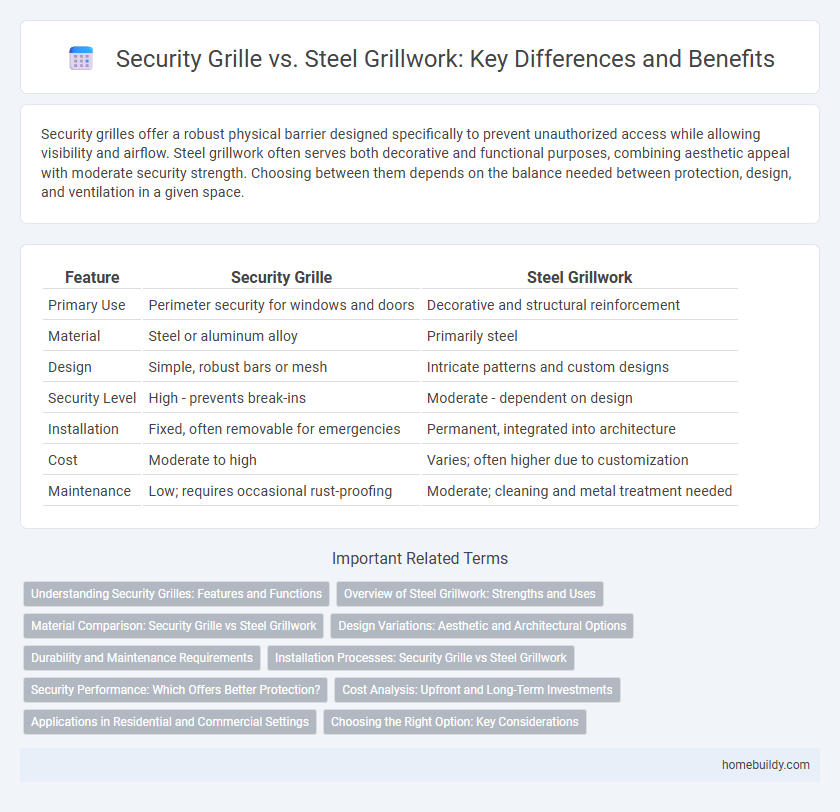Security grilles offer a robust physical barrier designed specifically to prevent unauthorized access while allowing visibility and airflow. Steel grillwork often serves both decorative and functional purposes, combining aesthetic appeal with moderate security strength. Choosing between them depends on the balance needed between protection, design, and ventilation in a given space.
Table of Comparison
| Feature | Security Grille | Steel Grillwork |
|---|---|---|
| Primary Use | Perimeter security for windows and doors | Decorative and structural reinforcement |
| Material | Steel or aluminum alloy | Primarily steel |
| Design | Simple, robust bars or mesh | Intricate patterns and custom designs |
| Security Level | High - prevents break-ins | Moderate - dependent on design |
| Installation | Fixed, often removable for emergencies | Permanent, integrated into architecture |
| Cost | Moderate to high | Varies; often higher due to customization |
| Maintenance | Low; requires occasional rust-proofing | Moderate; cleaning and metal treatment needed |
Understanding Security Grilles: Features and Functions
Security grilles offer enhanced protection with flexible designs that combine visibility and ventilation, making them ideal for securing windows and doors without compromising airflow. Unlike traditional steel grillwork, security grilles often feature tamper-resistant materials and locking mechanisms that provide superior resistance against forced entry. Their modular installation and customizable patterns allow for tailored security solutions in residential, commercial, and industrial settings.
Overview of Steel Grillwork: Strengths and Uses
Steel grillwork offers exceptional strength and durability, making it ideal for security applications requiring robust protection against unauthorized access. Its resistance to corrosion and high tensile strength allows for long-lasting performance in various environments, including commercial and industrial settings. Commonly used for window guards, perimeter fencing, and secure gates, steel grillwork combines functionality with aesthetic customization options.
Material Comparison: Security Grille vs Steel Grillwork
Security grilles are typically made from lightweight aluminum or galvanized steel, offering excellent corrosion resistance and ease of installation, whereas steel grillwork often uses heavier, carbon steel which provides superior strength but requires regular maintenance to prevent rust. The choice of material directly impacts durability, with security grilles favoring flexibility and weather resistance while steel grillwork emphasizes robustness and long-term protection. Material quality and treatment methods, such as powder coating or galvanization, significantly affect the lifespan and performance of both security grilles and steel grillwork.
Design Variations: Aesthetic and Architectural Options
Security grilles offer a wide range of design variations that enhance both aesthetic appeal and architectural integration, featuring customizable patterns, finishes, and materials that complement modern and traditional building styles. Steel grillwork, while often more robust, tends to prioritize strength over intricate design, making it ideal for industrial or utilitarian applications but less adaptable for decorative purposes. Choosing between security grilles and steel grillwork depends on balancing visual harmony with security requirements in various architectural contexts.
Durability and Maintenance Requirements
Security grilles offer enhanced durability compared to steel grillwork due to their robust materials such as aluminum or stainless steel, which resist rust and corrosion effectively. Maintenance of security grilles is typically lower, requiring only occasional cleaning and lubrication, while steel grillwork demands frequent inspections and preventive coatings to avoid deterioration. The long lifespan and minimal upkeep of security grilles make them a cost-effective choice for securing premises without compromising structural integrity.
Installation Processes: Security Grille vs Steel Grillwork
Security grilles typically feature a modular design that allows for quicker installation using pre-fabricated panels anchored directly to window or door frames, minimizing labor time and disruption. Steel grillwork often requires custom fabrication onsite, involving precise measurements, cutting, welding, and fitting that extend installation duration and complexity. The streamlined installation process of security grilles makes them a preferred choice for projects with tight timelines or retrofit applications.
Security Performance: Which Offers Better Protection?
Security grilles provide enhanced protection with their tightly woven, impact-resistant materials designed to deter forced entry and vandalism more effectively than traditional steel grillwork. Steel grillwork, while offering basic security, often features wider gaps and less robust construction, making it easier to breach under force. The superior strength and design of security grilles ensure a higher level of security performance, especially in high-risk or commercial environments.
Cost Analysis: Upfront and Long-Term Investments
Security grilles typically cost less upfront compared to steel grillwork due to simpler fabrication and installation processes. Steel grillwork, while more expensive initially, offers greater durability and lower maintenance costs, resulting in better long-term investment value. Evaluating total lifecycle expenses, including repairs and replacements, is crucial for accurate cost-benefit analysis between security grilles and steel grillwork.
Applications in Residential and Commercial Settings
Security grilles are designed primarily for residential applications, offering enhanced window and door protection with customizable designs that blend aesthetically with home decor. Steel grillwork, favored in commercial settings, provides robust security for storefronts, warehouses, and industrial facilities due to its heavy-duty construction and resistance to tampering. Both solutions improve property security, but security grilles prioritize appearance and ease of use, while steel grillwork emphasizes maximum strength and durability for high-risk environments.
Choosing the Right Option: Key Considerations
Security grilles provide a flexible and visually appealing solution for securing windows and doors, offering easy installation and adjustable designs, while steel grillwork is known for its superior strength, durability, and customizability for high-security needs. When choosing between a security grille and steel grillwork, consider factors such as the level of protection required, aesthetic preferences, budget constraints, and installation complexity. Prioritizing fire safety regulations and maintenance requirements ensures selecting the most effective and compliant security barrier.
Security grille vs Steel grillwork Infographic

 homebuildy.com
homebuildy.com